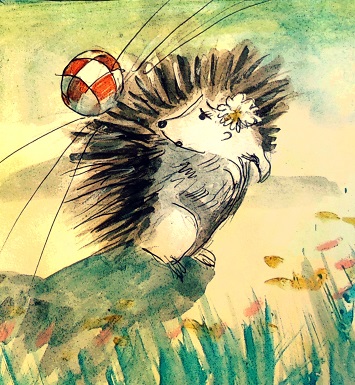Being Different
Piglet once said “The things that make me different are the things that make me ME” (AA Milne). Wise words from Winnie the Pooh's trusty sidekick. We are all unique with qualities that give us our own special identity, and the world is a more interesting place because of our individuality.
However some of us may not want to stand out from the crowd as much as we do. Or maybe, quirks and all, we want the chance to come together as a team but our unconventional characteristics get in the way. As a parent or carer, it's important to be able to talk openly with children about being different and to discuss any associated issues or anxieties.

Children should be encouraged to appreciate their own unique talents. Everyone is different and acknowledging this can help to ward off negative thoughts and feelings, such as not feeling good enough when comparing their achievements with those of others (Prof R Winston)
Daisy the Hedgehog is a children's story about being different. It's about a hedgehog who longs to play with others but she doesn't have any friends because she looks quite scary and her prickles might burst their football. She spends a lot of time alone, but with the help of kind and wise Mr Blackbird she finds a way to join in and bring her own special talent to the game.
The message for children is that it's okay to be different, and also that we should look beyond a “prickly” exterior to see the positives in others. We all have different skills and abilities, we sometimes just need a helping hand to identify and share them. With gentle rhyming verse and beautiful illustrations, the story looks at issues such as sadness and feeling lonely, and is an opportunity to teach young children positive values about tolerance and diversity. Without early and active involvement your child may start believing the prejudices and stereotypes of the people in their environment and the media, so looking at these issues through fun to read books can help children see that the world is a much richer place because of it's diversity. (M Wallace)
Proactive mental health starts early. The United Nations Convention on the Rights of the Child (UN / Barnado's) states that health is the basis for a good quality of life and mental health is of overriding importance. Reading together gives parents and carers an opportunity to start talking with children about issues which can have a negative effect on their wellbeing and mental health, and can help children to find a way to manage emotions and deal with life's challenges. Combining active listening with empathy can be a great way to bond and has been shown to improve relationships. (SK Whitbourne)
There are times when we all need help to overcome difficulties. We may need a reminder to look beyond the superficial and make an effort to empathise with others on our lifelong journey. Talking about these things from an early age can only be a good thing in my opinion.